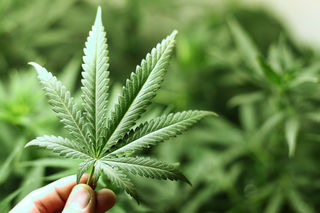Intelligence
To Toke or Not to Toke?
Using cannabis may impact your IQ, academic performance, and brain health.
Posted August 12, 2019

I am fortunate to have an expert co-author on this post: Melanie Hill is a sixth-year Ph.D. candidate in clinical psychology who has studied the effects of cannabis on various aspects of brain function in the laboratory of Madeline Meier in the Psychology Department at Arizona State University. Her doctoral work was supported by a National Science Foundation Graduate Research Fellowship, and she is now completing her pre-doctoral internship at UC San Diego/VA San Diego.
Recent laws have legalized cannabis, and norms have shifted in America about the acceptability of cannabis use. Among these changes, fewer teenagers perceive cannabis to be risky or harmful to their health. For example, in 2006, 58 percent of 12th-graders believed that regular cannabis use carried a great risk of harm. Ten years later, that number dropped to less than 33 percent (Johnston et al. 2017).
Are these perceptions consistent with existing research on cannabis-related risks? Perhaps not for adolescents. The adolescent brain is still in development and thus may be particularly vulnerable to the effects of medications and drugs that alter cognition and behavior. Therefore, it is important for research to provide young people with an accurate assessment of the risks associated with cannabis use. A better understanding of these risks can help parents, teens, and young adults make informed choices regarding the use of cannabis.

Madeline Meier heads the Substance Use, Health, and Behavior Lab at Arizona State University. The lab studies the effects of cannabis, especially high-potency cannabis products (cannabis concentrates) and novel methods of consuming cannabis (vaping).
Meier has collaborated with teams around the world to investigate the positive and negative health effects of cannabis, focusing on the link between cannabis use and three important outcomes: IQ (intelligence quotient), the health of small blood vessels that may help support cognitive function, and academic performance. (Learn more about her work in this video interview.)
These findings provide clues about the possible impact of cannabis use on cognition and the brain. As such, they can help inform decisions about cannabis use – for users as well as policy-makers, physicians, and educators.
To understand how long-term cannabis use might impact IQ, Meier and her collaborators looked at IQ data from over one-thousand New Zealanders in childhood and again at age 38, before and after they began using cannabis (Meier et al 2012). Individuals who began using cannabis in adolescence and continued using persistently into middle age experienced an average decline of 8 IQ points over the course of the study.
Individuals who began using cannabis in adulthood showed no decline in IQ. This was still true after accounting for alternative explanations, like dependence on alcohol and other drugs, dropping out of school, and serious mental health problems.
If long-term cannabis use beginning in adolescence is potentially damaging, is short-term use during the teenage years also linked to IQ decline? To address this question, Meier and colleagues measured cognitive function in nearly 2,000 adolescent twins. Although adolescents who abused cannabis had poorer cognitive function than those who did not use cannabis, they did not show a decline in IQ from before to after they began using cannabis.
Moreover, twin pairs, in which one twin used cannabis and the other did not, performed similarly on cognitive tests. This suggests that family factors such as genetics may have caused poorer cognitive function among adolescents who abused cannabis. Together, these two studies indicate that short-term cannabis use during adolescence may not lower IQ, but more long-term use that persists into adulthood might.
If cannabis use that persists into adulthood does affect IQ, what mechanism might be responsible? One possibility is that cannabis use changes brain physiology. For example, some research suggests cannabis use affects blood flow to the brain, perhaps through changes to the small blood vessels that carry blood to the brain (arterioles) and back to the heart (venules).
To investigate this possibility, a recent study from the Meier lab used a novel technology, retinal imaging, to visualize the smallest blood vessels in the retina (the back of the eye) of non-intoxicated cannabis users and non-users (Hill et al., 2019).
Because the structure and function of the blood vessels are similar in the eye and brain, the retinal vessels provide a window into the health of the brain’s blood vessels. It turns out that cannabis users had wider arterioles than non-users. What does this mean? It suggests these blood vessels might be dysfunctional; i.e. have problems dilating and constricting in response to changes in blood pressure. Previous studies have linked wider retinal arterioles to problems with this regulatory ability.
This could be dangerous because arterioles dilate to increase blood flow and constrict to reduce blood flow. If this ability is impaired, too much blood flow can cause the vessels to rupture and too little blood flow can prevent delivery of oxygen and nutrients to the brain. Therefore, it is possible that differences in arteriolar diameter could contribute to worsening cognitive function in cannabis users.
This study, however, only tested differences between cannabis users and non-users at a single point in time, so it could be that cannabis users start out with wider arterioles than non-users. We know that wider vessel diameter correlates with cannabis use but we aren’t sure yet if cannabis use causes wider vessel diameters. To address this, future studies might measure retinal vessel diameter before and after participants begin using cannabis to determine whether retinal vessels widen and whether such changes predict IQ decline.
In addition to potential effects on IQ test performance and blood vessels, teens and parents might wonder: Is adolescent cannabis use linked to real-world consequences such as school performance? Meier and colleagues followed affluent high school students from 9th to 12th grade (Meier, Hill, Small, & Luthar, 2015). Teens who used cannabis throughout high school showed a decline in grade point average across the four years and had lower SAT scores in 12th grade than non-using peers.
So, adolescents who persistently use cannabis can suffer real-world consequences that affect future professional success. Moreover, all participants in this study came from an affluent community, so the link between cannabis use and poor academic performance was not because cannabis users were more disadvantaged.

Taken together, these findings provide important information for parents and teens to consider as cannabis laws and norms change. They also highlight the need for more research that looks at the consequences of other changing factors, such as the potency of cannabis and the availability of discreet means of using. THC (delta-9-tetrahydrocannabinol) is the main component of cannabis responsible for the ‘high’ users experience. Importantly, the THC content of cannabis has increased dramatically over the past two decades and cannabis concentrates with up to 80 percent THC are becoming more common (Chandra et al., 2019).
Research from Dr. Meier’s lab has shown that new methods of using cannabis such as vaping allow users to be more discreet, so they can be used in a greater variety of places (Jones et al., 2016; Jones et al., 2018). Therefore, there is a growing need to understand the impact of cannabis use that is frequent, long-term, and involves high-potency forms of cannabis. Access to such information could improve the health and well-being of a generation coming of age in the era of legal cannabis.
References
Chandra, S., Radwan, M. M., Majumdar, C. G., Church, J. C., Freeman, T. P., & El Sohly, M. A. (2019). New trends in cannabis potency in USA and Europe during the last decade (2008–2017). European archives of psychiatry and clinical neuroscience, 269(1), 5-15
Cheung, N., Rogers, S. L., Donaghue, K. C., Jenkins, A. J., Tikellis, G., & Wong, T. Y. (2008). Retinal arteriolar dilation predicts retinopathy in adolescents with type 1 diabetes. Diabetes care, 31(9), 1842-1846.
Herning, R. I., Better, W. E., Tate, K., & Cadet, J. L. (2005). Cerebrovascular perfusion in marijuana users during a month of monitored abstinence. Neurology, 64(3), 488-493.
Hill, M., Wong, T.Y., Davis, M., & Meier, M.H. (in press). Associations between Cannabis Use and Retinal Vessel Diameter in Young Adults. Schizophrenia Research.
Johnston, L. D., O'Malley, P. M., Miech, R. A., Bachman, J. G., & Schulenberg, J. E. (2017). Monitoring the Future National Survey Results on Drug Use, 1975-2016: Overview, Key Findings on Adolescent Drug Use. Institute for social research.
Jones, C. B., Hill, M. L., Pardini, D. A., & Meier, M. H. (2016). Prevalence and correlates of vaping cannabis in a sample of young adults. Psychology of Addictive Behaviors, 30(8), 915.
Jones, C. B., Meier, M. H., & Pardini, D. A. (2018). Comparison of the locations where young adults smoke, vape, and eat/drink cannabis: Implications for harm reduction. Addictive behaviors reports, 8, 140-146
Meier, M. H., Caspi, A., Ambler, A., Harrington, H., Houts, R., Keefe, R. S., ... & Moffitt, T. E. (2012). Persistent cannabis users show neuropsychological decline from childhood to midlife. Proceedings of the National Academy of Sciences, 109(40), E2657-E2664.
Meier, M. H., Caspi, A., Danese, A., Fisher, H. L., Houts, R., Arseneault, L., & Moffitt, T. E. (2018). Associations between adolescent cannabis use and neuropsychological decline: a longitudinal co‐twin control study. Addiction, 113(2), 257-265.
Meier, M. H., Hill, M. L., Small, P. J., & Luthar, S. S. (2015). Associations of adolescent cannabis use with academic performance and mental health: a longitudinal study of upper middle class youth. Drug and alcohol dependence, 156, 207-212




